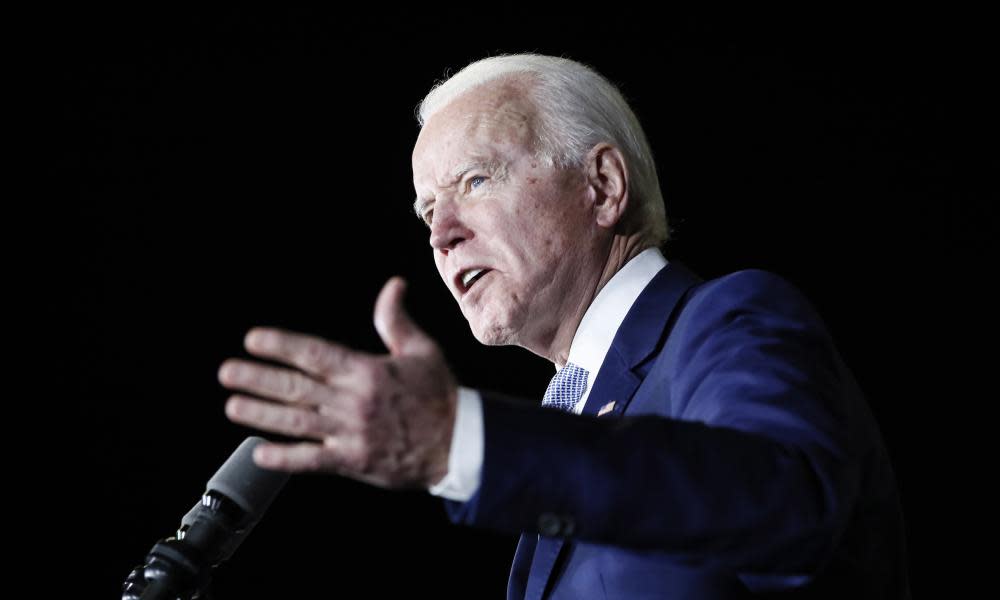Joe Biden is surging but his campaign has one weak spot: Joe Biden himself

Super Tuesday was a powerful reminder that Twitter is not the real world. Of course, we knew this, or could have known this. Pew Research had shown several times that Democrats on Twitter are more liberal than Democrats overall, and that Twitter Democrats are less supportive of Joe Biden and more supportive of Bernie Sanders and Elizabeth Warren. But pushed by some early wins, and the overwhelming presence of a loud minority on social media, the Sanders train took off in the traditional media too, bringing excitement and panic to liberal and moderate journalists and pundits alike.
It was not to be. Not Sanders but Biden was the big winner of Super Tuesday. Winning 10 of the 14 states in play, he only left Sanders the big prize of the delegate-richest state of California, and even there he ate into the Vermont senator’s delegate count, in part helped by Mike Bloomberg and Elizabeth Warren, who both polled above 10% but below the 15% viability threshold.
Related: What to make of the Super Tuesday results? Our panelists' verdict
Now that Bloomberg has dropped out, the pressure on Warren to follow suit will be huge. Bloomberg only entered the race to stop the progressive agenda of Sanders and Warren and, after spending a perverse half a billion of dollars on his campaign, only had American Samoa to show for. He is expected to save face by putting his money and support behind Biden, which could be the push he needs to transform a plurality into a majority at, or before, the Democratic national convention in Milwaukee.
This puts even more pressure on Warren, whose campaign never bounced back from its – still largely unexplained – November slump. Despite excellent debate performances, she had a dismal Super Tuesday, being viable in only a couple of states, and even coming in third in her own home state of Massachusetts. She wasn’t able to pick up any “wonk votes” from Pete Buttigieg or “female votes” from Amy Klobuchar, who both suspended their campaigns days before Super Tuesday.
Hence, it is time to bow out for Warren, and let Sanders defend the progressive camp against the now consolidated moderate camp of Biden. She can do so with her head up high, as at the very least her debate performances have helped to stop Bloomberg and led to the resignation of Chris Matthews, a long-term embarrassment for liberal media.
The most remarkable aspect of Super Tuesday is that Biden won in states that he had spent little money in and had few campaign staff
The most remarkable aspect of Super Tuesday is that Biden won in states that he had spent little money in and had few campaign staff. Against the millions of dollars of Bloomberg, and the tens of thousands of volunteers of Sanders, Biden seem to have won the good old-fashioned way, through endorsements.
South Carolina’s iconic congressman Jim Clyburn’s endorsement, which started the “Joementum”, led to Biden’s massive win in South Carolina, followed by withdrawals from his moderate rivals, as well as the impeccably rolled-out endorsements of Buttigieg, Klobuchar and Beto O’Rourke just before Super Tuesday. The fact that an endorsement and win in South Carolina, a state that will solidly support Trump in November, could have fundamentally changed the outcome of the Democratic primaries is yet another example of the complete irrationality of the primary process.
Given that money and people will be flooding into the Biden campaign into the coming days and weeks, there is little reason to assume Joementum will die off soon. Moreover, while a significant number of moderate early votes had still been cast for Buttigieg and Klobuchar on Super Tuesday, this will no longer be the case in the upcoming primaries. Many of the next primaries are in moderate states, such as Mississippi and Missouri, which should be Biden territory.
Where does this leave Sanders? To be clear, the Sanders camp is still very much alive. The problem is, his campaign seems to have hit its ceiling. Sanders has a solid support of roughly one-quarter of Democrats and has been able to expand that to about one-third. Even if he would be able to capture the full Warren support – which is doubtful given growing tensions between the campaigns and their supporters – it would not be close to 50%.
The next big test for both Biden and Sanders is Michigan, the type of swing state that both candidates have staked their claim of defeating Trump in November on. Will “Uncle Joe from Scranton” be able to dig into Sanders’ support among the white working class, while also carrying the moderate suburban vote? Or will Sanders finally prove that he is the (only) candidate to win both new voters and some of Trump’s white working class?
At the moment, everything seems to point at, at least, a Biden plurality. But his campaign will always have one lethal weak spot: Joe Biden. Gaffes have killed his earlier runs and could still kill this one too. It might be Sanders’ best, and only chance at winning the nomination. Because the way Joementum is going, Sanders might regret his recent statements that the candidate with a plurality should become the nominee at the Democratic national convention.

